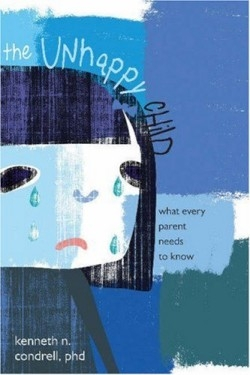The Unhappy Child
What Every Parent Needs to Know
Although early twenty-five percent of U.S. children suffer from depression, fewer than twenty percent of emotionally troubled children in this country receive help. Yet the vast majority of parents, if asked, would likely say that what they want most is for their child to be happy. This dichotomy speaks volumes, both about the difficulties of raising children in the U.S. today and about how children really do have strong emotional lives that need support and care, just as much as their physical beings. But not all parents are easily prepared for that type of care.
In this book, the nerve-wracking topic of depressed children is covered soothingly and proactively. The author, a child psychologist and family practice therapist who has been in private practice for thirty-five years, has seen thousands of families with depressed children, and he wrote this book to address the primary causes of that unhappiness: mismanaged divorces or stepfamilies; depressed, quarreling, angry, or overly permissive parents; children who feel like failures; peer rejection and cruelty; parental favoritism; and sibling abuse. It is a daunting list—but Condrell breaks each cause down in individual chapters, looking at the symptoms and outcomes, then provides examples from his years of experience as a therapist. Heartbreaking stories of children who feel unloved, who feel no one will ever love them, resonate as examples of how deeply children feel their own pain.
Although this may sound grim, each chapter offers a section on solutions, giving parents concrete advice and suggestions for working with depressed children, depending on the cause. For example, in the chapter on depressed parents, Condrell discusses the clear links between a depressed parent and a subsequently depressed child, then notes, among other things, the importance of explaining to the child that the adult’s depression is not the child’s fault. But he also understands that the parent must heal too: the list of solutions for this chapter invites parents to learn about depression in order to work with their own mental health, and to make time for themselves and not feel guilty about it, and to hold valuable family meetings to air these concerns and strengthen connections between parents and children. Finally, each chapter concludes with a list of resources relevant to that chapter’s topic, so parents who want further information and help will have a ready-made guide.
The physical care of children is demanding by itself, but add the more complex arena of mental health, and parenting can sometimes feel overwhelming. Condrell’s book is a solid guide to beginning to work through depression and mental health issues, with grounded suggestions and a friendly tone to encourage parents to strengthen not only their child’s mental health, but their own as well.
Reviewed by
Amy Rea
Disclosure: This article is not an endorsement, but a review. The publisher of this book provided free copies of the book to have their book reviewed by a professional reviewer. No fee was paid by the publisher for this review. Foreword Reviews only recommends books that we love. Foreword Magazine, Inc. is disclosing this in accordance with the Federal Trade Commission’s 16 CFR, Part 255.

